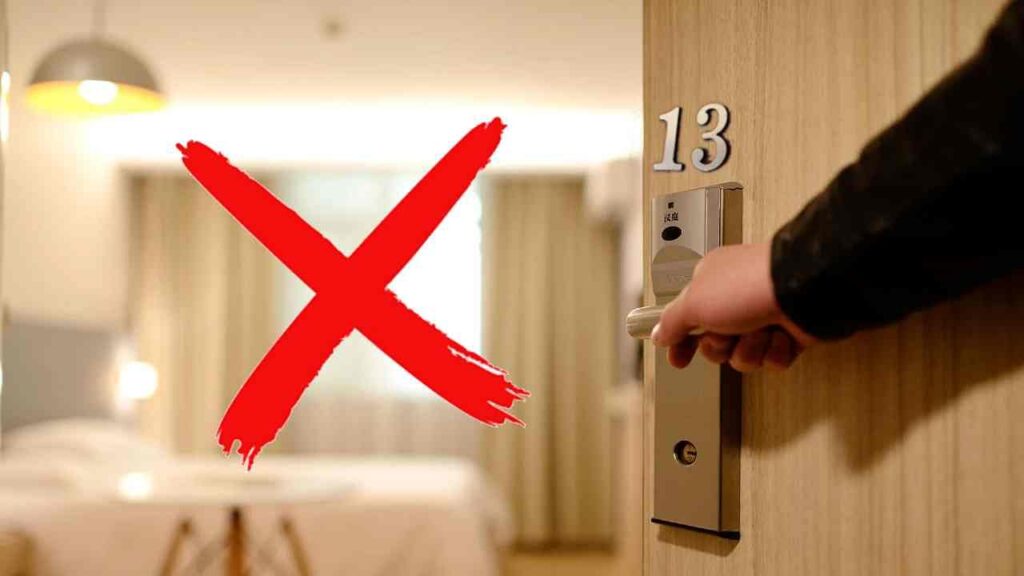Friday the 13th is a date steeped in Western superstition, causing unease with its lore-ridden reputation and association with misfortune. As this ominous day approaches at least once annually, caution takes hold due to the convergence of Friday—an unlucky day—and the number thirteen, notorious for its ill repute.
On such days, cultural tales abound, advising against common activities like walking under ladders or crossing paths with black cats, and suggesting the delay of significant decisions or travel.
While some may consider Friday the 13th as a chance to be cautious, others treat it as normal. Nevertheless, the day captivates many, influencing behaviors meant to avoid bad luck. But as you venture into this day, you may wonder, what exactly should you avoid to side-step the ill-fate that legend says lurks around every corner? Please refer to the list that LotusBuddhas will share below.
1. Traveling
You may have heard that traveling on Friday the 13th is something to be avoided, and you might wonder why this specific day could affect your journey. Folklore suggests that bad luck is more likely to be encountered on this day, and when it comes to travel, an industry where safety and timeliness are paramount, the stakes feel even higher.
Consider the common travel concerns: delayed flights, lost luggage, traffic jams, or even more serious incidents. Superstition holds that on Friday the 13th, the likelihood of these unfortunate events increases. Whether there’s any statistical truth to this, the power of suggestion can be quite strong. You might find yourself more anxious, second-guessing your decisions, or being extra cautious, which in turn could dampen the joy of your travels.
Moreover, the mythos of Friday the 13th may also influence the behavior of others around you. From airport staff to fellow travelers, the collective consciousness of ‘bad luck’ could impact the mood and efficiency of those you rely on to get to your destination.
For example: A nervous flyer on board may be more on edge, or an airline staffer dealing with superstitious travelers may become more stressed, potentially leading to service that’s not up to its usual standard.
It’s not just about the external factors; it’s about your internal state of mind, too. If you’re feeling apprehensive because of the date, your travel experience could be colored by your own expectations. You might be more susceptible to confirmation bias, where you unconsciously look for patterns to confirm your belief that Friday the 13th is indeed an unlucky day for traveling.
2. Using the number 13
On a day like Friday the 13th, avoiding the number 13 could be seen as a way to sidestep potential bad luck. It’s not that using the number 13 will necessarily cause misfortune, but on a day already notorious for superstition, you might find yourself more susceptible to noticing and remembering negative outcomes associated with it.
Choosing to avoid the number 13 on this date, perhaps by not setting appointments for 13:00 or staying on the 13th floor of a hotel, is less about the actual avoidance of misfortune and more about the comfort that comes from minimizing connections to what many consider an unlucky symbol. It’s a psychological cushion, a way to keep at bay the nagging thought that you might have tempted fate on an already supposedly unlucky day.
Remember, superstitions about the number 13 are largely cultural. In some parts of the world, it’s a lucky number. However, when it comes to Friday the 13th in the West, it’s about staying in a positive mindset. If skipping over the number 13 can contribute to a better mental state, then it’s a small and effortless gesture to keep your spirits high and your day unencumbered by the weight of superstition.
3. Walking under ladders
The origins of the ladder superstition are rooted in the idea that a ladder against a wall forms a triangle, historically symbolic of the Holy Trinity. To pass through this triangle was seen as breaking the Trinity, a sign of disrespect and thus, a predictor of misfortune. On Friday the 13th, a day already brimming with talk of jinxes and curses, the last thing you want is to add more fuel to the fire by inviting more bad luck.
Whether or not you’re superstitious, avoiding walking under ladders can also be seen as a good safety tip, especially on a day when people might be more prone to distraction due to the date’s reputation. Ladders can be unstable, and objects might fall, making it a practical decision to give them a wide berth.
So, on Friday the 13th, it may just be wise to play it safe and walk around ladders. Why tempt fate on a day already notorious for misfortune? Plus, it’s always a good idea to avoid potential hazards, regardless of the date.
4. Opening umbrellas indoors
Opening an umbrella indoors is one of those actions that’s traditionally been associated with bad luck. The superstition dates back to the ancient Egyptians, who believed that umbrellas protected against the evils of the sun. To open one indoors, away from the sun’s rays, was to insult the sun god and invite misfortune upon yourself.
On Friday the 13th, a day when superstitions are at the forefront of everyone’s mind, opening an umbrella inside might seem especially imprudent. It’s not necessarily that you believe a day or an action can curse you, but rather that the cultural narrative around this day is powerful. You’re more likely to notice—and remember—any bit of bad luck that occurs, reinforcing the superstition.
Moreover, you should consider the practical side: umbrellas can be unwieldy, and opening one indoors could lead to accidents or damages—knocking over an item, poking someone, or spilling something. On a day that’s already infamous for misfortune, why increase the odds of an unfortunate incident?
5. Crossing paths with black cats
Crossing paths with a black cat on Friday the 13th is one of those superstitions that’s particularly tenacious. In many cultures, black cats have been associated with witchcraft, bad luck, and misfortune. And when such a cat crosses your path on a day already notorious for bad luck, it’s thought to be an omen that amplifies the chance of misfortune befalling you.
The origins of this belief may seem outdated, but they linger in the collective consciousness. On Friday the 13th, people are often more attuned to the superstitions that have been passed down through generations, and seeing a black cat might make you pause—a reaction that’s not just about the superstition itself, but about how it’s been ingrained in society’s psyche.
Whether or not you believe in these old tales, there’s something to be said for the power of suggestion. If you see a black cat on this day and you’re aware of the superstition, it could subconsciously affect your mood and actions, making you more anxious or distracted—and ironically, more prone to the very bad luck you’re hoping to avoid.
So, if you find yourself out and about on Friday the 13th and spot a black cat, you might choose to take a different path—not necessarily because you believe it will change your fate, but because sometimes, peace of mind comes from steering clear of the things that spook us, even if just a little. Plus, it can’t hurt to be cautious on a day when caution is already in the air.
6. Breaking mirrors
Breaking a mirror is considered unlucky by many, with superstitions claiming it can bring seven years of bad luck. This belief dates back to ancient times when mirrors were thought to not only reflect your appearance but also your soul. A broken mirror, therefore, was believed to damage the soul. On Friday the 13th, breaking a mirror might feel like you’re inviting a double dose of misfortune.
When you combine the mirror’s supposed ability to fracture your spiritual well-being with the day’s reputation for general misfortune, you’ve got a recipe for a particularly anxious state of mind. It’s not just about the superstition itself, but the way it can amplify the day’s ominous overtones and affect your mindset. If you do happen to break a mirror on this day, you might find that the event sticks with you, coloring the rest of your day with a shade of unease.
While there’s no scientific basis for a link between broken mirrors and bad luck, the psychological impact of such an event can be real. If you’re aware of the superstition, breaking a mirror on Friday the 13th could set a pessimistic tone for your day or even longer, given the lore surrounding such an act.
7. Spilling salt
This belief has roots in the Last Supper, where Judas is often depicted as spilling salt, an event that preceded the betrayal of Jesus. As salt was a valuable commodity in ancient times, to spill it was akin to throwing away money, hence the association with misfortune.
On a day as infamously unlucky as Friday the 13th, spilling salt could seem like you’re kicking off a series of unfortunate events. Superstition says that if you do spill salt, tossing a pinch over your left shoulder can counteract the bad luck, as it’s supposed to blind the devil waiting there.
Whether you view these rituals as quaint holdovers from the past or something of a more serious nature, being mindful about not spilling salt—or any other activity that’s said to bring bad luck—can also be about maintaining a positive mindset. After all, spilling salt can be messy, and on a day when people are already on edge, it’s the small annoyances that can feel magnified.
8. Haircut or nail cutting
Getting a haircut or cutting your nails on Friday the 13th is something you might want to postpone—not necessarily because it will bring misfortune, but because of the psychological impact such superstitions can have.
The notion that cutting your hair or nails could affect your luck is a piece of folklore that appears in various cultures. It’s tied to the belief that your hair and nails are extensions of your soul, so trimming them on an already unlucky day could symbolically “cut” into your good luck or life force.
On Friday the 13th, you’re likely to be more conscious of your actions and their potential outcomes, especially those steeped in superstition. Opting out of a haircut or nail trimming isn’t about giving in to fear, but about giving yourself one less thing to worry about. Superstitions can affect mood and confidence, even subconsciously, and if you’re already feeling a little wary due to the date, why add to it?
Plus, there’s a practical angle. Haircuts and nail trimmings are personal grooming tasks that you expect to go right, to make you feel better about yourself. If something does go wrong—say, your hair is cut shorter than you wanted or you nick a finger while trimming your nails—it’s easy to blame it on the “bad luck” of the day, which could sour your mood further.
9. Not placing a hat on the bed
Historically, it was thought that evil spirits resided in the hair, and hats, which cover the hair, were their resting places when not worn. By placing a hat on a bed, you were inviting these spirits into a place of rest and vulnerability, thereby calling bad luck upon yourself.
On Friday the 13th, you might want to be extra cautious about such actions, if only for peace of mind. Superstitions often thrive on the fear of the unknown and the human tendency to pattern recognition. You place a hat on your bed and later spill your coffee, it’s easy to connect the two events in your mind. On this particular day, that connection might seem even stronger because of the cultural narrative built around it.
Choosing not to place a hat on your bed on Friday the 13th is more about preserving a state of ease than actively avoiding a quantifiable threat. It’s a small, perhaps even insignificant action, but on a day when the specter of bad luck looms larger in the collective consciousness, it’s the small things that help keep apprehension at bay.
So, whether there’s any truth to the superstition or not, it costs you nothing to hang your hat on a rack or place it on a table instead. Consider it a simple way to sidestep any potential bad luck, to ensure that your day goes as smoothly as possible, without inadvertently “lying your fears to rest” where you sleep.
10. Starting new ventures
Embarking on new ventures is a bold move, and timing can feel like everything. Superstition holds that starting something new on Friday the 13th could set you up for bad luck.
It’s a day that carries a reputation for misfortune, and when it comes to new beginnings, you want all the positive energy you can muster. This could be anything from launching a business to kicking off a project. The worry is that the ill-fated aura of Friday the 13th might cast a shadow over the initial stages, or worse, thread through the lifespan of your venture.
There’s no hard evidence to suggest that new undertakings are more likely to fail if started on this particular day, but if you’re aware of the date and its connotations, it could affect your confidence. Doubts may creep in more easily, and your decision-making could be tinged with hesitation. This isn’t the ideal way to begin something that requires your full belief in its success.
Moreover, if others are aware of your start date and share the common superstitions, it could influence their perceptions or willingness to support your new endeavor right from the start. This is about more than just your own beliefs; it’s about how the stigma of Friday the 13th can impact the collective morale around a new venture.
In short, if you’re considering when to take that leap into a new business or project, and if the idea of Friday the 13th lingers in your mind, you might choose a different day for peace of mind. A day with a neutral or even positive connotation could give you and everyone involved the psychological boost needed for a prosperous beginning.















